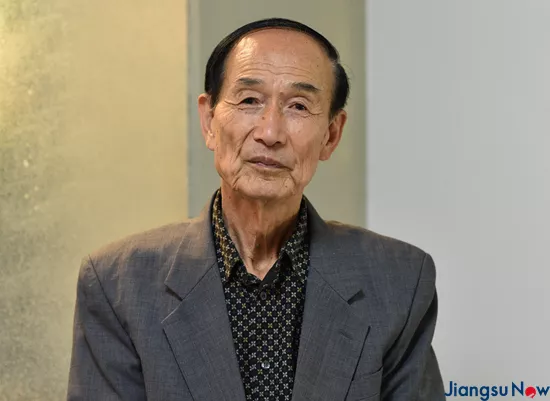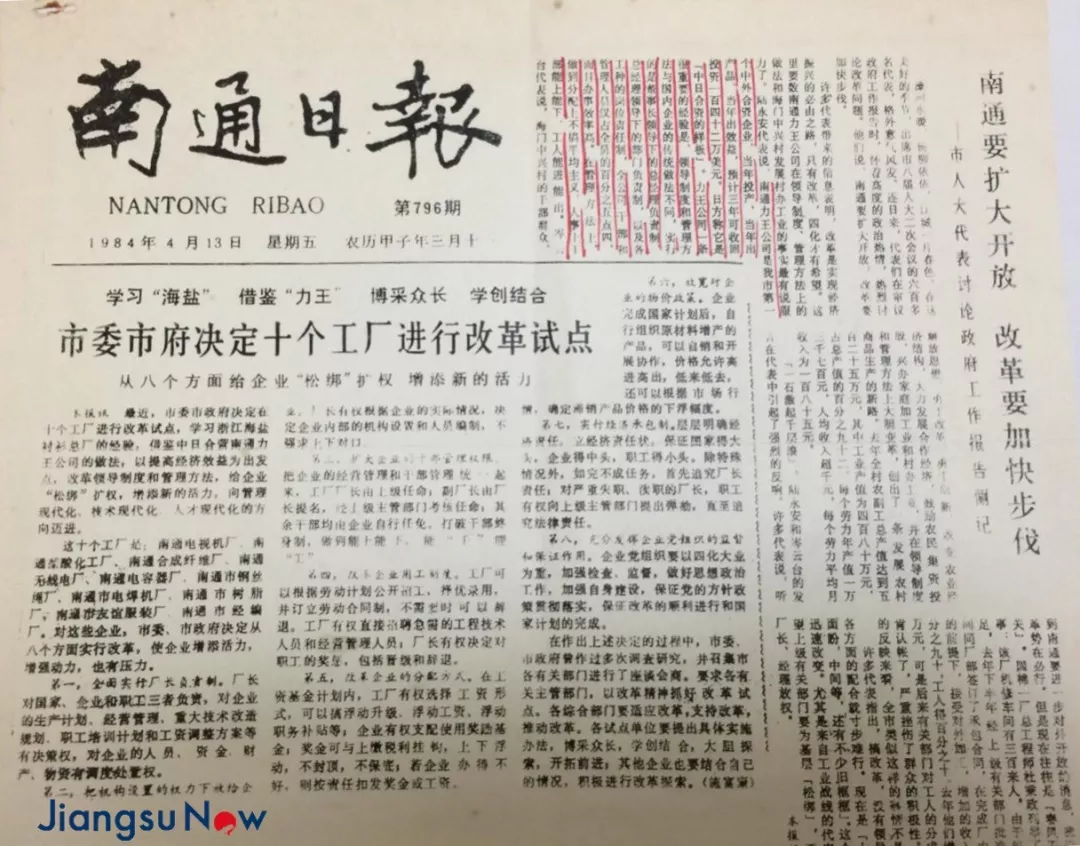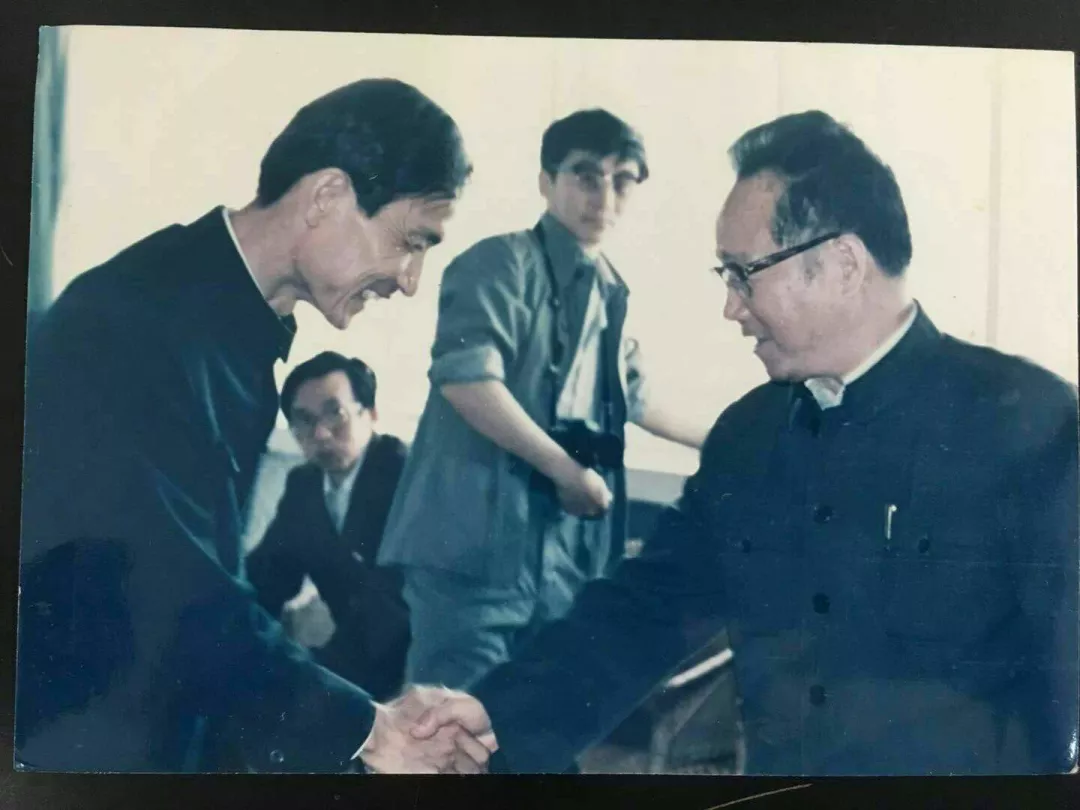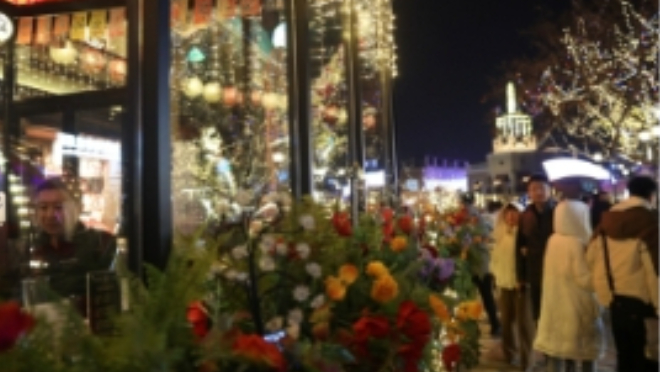Toshio Kato, 77, lives in an old neighborhood near the Youth Middle Road in Nantong City, Jiangsu Province.
加藤纪生的经历可不简单:他是江苏首家投产的中外合资企业南通力王有限公司总经理;1980年来南通,“半生都在这里度过”;先后担任7家日资公司总经理,亲身经历中国计划经济到市场经济的变革;他还是江苏省五一劳动荣誉奖章获得者、南通市荣誉市民、南通市人民政府高级经济顾问。
Kato is from Nagoya, Aichi Prefecture, Japan, and once worked as the general manager of Nantong Rikio Co., Ltd., the first Sino-foreign company that puts into production in Jiangsu. Kato has served as the general manager of seven Japanese-funded companies since he arrived in Nantong in 1980.
得知记者要来采访,加藤纪生把时间定在10月23日——因为40年前的这一天,《中日和平友好条约》正式生效。
也许是日本人特有的认真,刚进屋坐下,加藤纪生就递上一份简历和一沓剪报。这些全都是和他有关的报道,按时间顺序装订得整整齐齐,足有2厘米厚,其中还有1990年他在北京人民大会堂参加国庆41周年招待会的报道。翻阅着这些已经泛黄的报纸,加藤纪生向记者讲述了他的南通往事……

▲加藤纪生接受新华日报全媒体国际传播部记者&Now君采访。
“南通宝地展事业 通力合作结硕果”
“因为改革开放,我来到南通。”加藤纪生说,1978年,中国实行改革开放,“消息传到日本,震动整个工商界。”1979年7月,《中外合资经营企业法》破茧而出,日本力王株式会社萌生了来中国内地投资设厂的想法。
"It is China's reform and opening up started in 1978 that promps Japanese outdoor footwear manufacturer Rikio to think of investment in China," Kato said.
南通虽有“中国近代第一城”之称,但是当时大家对这座城市知之甚少,为什么选择南通?加藤纪生说:“我们是一家生产劳动保护鞋的企业,南通是纺织之乡,轻纺工业发达,在设备和原材料采购方面有得天独厚的优势,产品还可以从上海出口。”
"The investment landed in Nantong, because the city has prosperous textile industry, enjoys unique advantages in equipment and raw materials procurement, and the products can also be exported from Shanghai,” Kato added.
经过一年多的筹备,1982年2月,总投资142万美元的南通力王有限公司成立。分配上不搞“大锅饭”,人事上不搞“铁饭碗”,观念上的碰撞,管理上突破“禁区”,在当时开创先河,也给公司带来了利润。

▲1984年4月13日,《南通日报》关于南通力王有限公司的报道。
“南通力王公司是我市第一家中外合资企业,当年投产,当年出效益。”这是1984年4月13日《南通日报》的头版报道,文章标题是《南通要扩大开放 改革要加快步伐》。加藤纪生介绍说,日方原本估计第一年可能亏损10多万美元,没想到当年就实现盈利,两年半收回全部投资。
Nantong Rikio was founded in February 1982, with a total investment of $1.42 million. It was estimated that the company might lose more than $100,000 in the first year. Instead, it not only made profits, but recovered all the investment in two and a half years.
大家都问,作为“第一个吃螃蟹的人”,经营上是不是遇到很多困难?加藤纪生认真想了想,回答说:“很顺利,凡是双方协商确定的事,中国人都言出必行,不必担心多虑。再加上政府支持,南通力王越长越壮实。”
"The Chinese side always keeps promises, delivering what they commit in the agreement, and local Nantong government also gave full support. There’s really no need to worry,” said Kato.
2
“改革开放浪浪高 中华大地受青睐”
1984年5月4日,国务院发出《沿海部分城市座谈会纪要》的通知,南通成为进一步开放的14个沿海港口城市之一。但是,中国改革开放之初,物资匮乏,生活水平与日本相比有天壤之别,这给加藤纪生带来不少困扰。
On May 4, 1984, Nantong became one of the 14 coastal cities to further open up. However, life was not easy at that time.
“有一次,我在街上看到很多人排队买馒头,我也就排在后面。轮到我时,我掏出外汇券,可营业员不收,只收粮票,最后只能作罢。”加藤纪生说,到上海出差,江苏粮票不能用,必须要换成全国粮票。但是现在,大家已经习惯手机支付。“以前出门没东西买,现在不出门就能买到。”
At that time, food coupons, known as liangpiao in Chinese, were needed even for a piece of steamed bread. Great changes have now taken place and everyone is used to mobile payments. “People had few things to buy before, but they can now buy almost everything at home.”
当时,加藤纪生的口袋里还常备一个网兜,路上看到时令水果就赶紧买一些。“过了这个村就没这个店了,哪像现在,品种这么多,应有尽有。”
Kato remembered he often carried a net bag with him so he could buy some seasonal fruits when he happened to find some. "But now, there are so many fruits varieties available," said Kato.
“去上海出差,我的车上还得备一个加油罐,路上没油了就自己加。要是坐船去上海,得花8个小时,去南京要13个小时。”加藤纪生说,外商在考察投资环境时,对交通看得很重,物流也要做到物畅其流。他亲眼看到一些外商面对长江“望江兴叹”,放弃了在南通投资的机会。
"For a trip to Shanghai, an extra fuel tank on the car was also necessary because of limited gas stations on the road. The boat journey to Shanghai from Nantong was about eight hours, and as long as 13 hours to Nanjing."
如今,天堑变通途,苏通大桥、崇启大桥以及即将建成的沪通大桥实现了南通和苏南、上海的快速连接,被长江隔开的客流和物流由此变得畅通。
Nowadays, Nantong boasts a great transport network. Suzhou-Nantong Yangtze River Bridge, Chongming-Qidong Yangtze River Bridge, and the soon-to-be-completed Shanghai-Nantong Yangtze River Bridge ensure Nantong’s link with southern Jiangsu Province and Shanghai.
将来,南通新机场+北沿江高铁目标建成长三角北翼重要航空港,通州湾15万吨级深水大港正加速推进。南通,全省唯一滨江临海的城市、出江入海的门户,正着力打造名副其实的长三角北翼经济中心。
In the future, Nantong’s new airport and the high-speed railway along the north of the Yangtze River will make the city an important air transport hub in the north wing of the Yangtze River Delta. The constuction of Tongzhou Bay, a deep-water port that can handle 150,000-ton vessels is also in full swing.

▲1984年5月,时任中共中央书记处书记、国务委员谷牧(右一)在南通力王公司会见加藤纪生。(照片由加藤纪生提供)
3
”感谢南通此经历 余生不忘忆过去“
加藤纪生已退休多年,可他不想让自己闲着。他先后在三家日资公司担任高级顾问,每周一、三、五都要去公司了解生产经营情况,为企业发展提建议。
After retirement, Kato has been working as senior consultant at three Japan-invested companies.
“一闲下来,就会比以往更想念家人。”加藤纪生说,这些年来,他一直只身赴任。加藤纪生39岁来到南通,那时儿子只有8岁。弹指一挥间,38年过去,双胞胎孙子明年就要上大学了。“想到妻子的默默付出和无条件的支持,心里满是愧疚。叶落归根,我还是要回去的。”
"I miss my family more than ever before, especially when I'm not busy," said Kato. He came to Nantong at 39, when his son was only 8 years old. As years pass by, his twin grandchildren are going to university next year.
可是,想到要离开中国,加藤纪生又很是不舍。如今,加藤纪生的日常生活跟许多中国老人一样,晨练、上街买菜、去银行交水电费,当然还有旅游。只要有时间,他就会带上中国“绿卡”,来一场说走就走的旅行。北到黑龙江,南到海南,他几乎去过中国所有省份。“趁现在身体还好,我要走遍中国大好河山。”加藤纪生说。
However, the thought of leaving China also makes Kato sad. With his Chinese "green card", Kato has visited almost all provinces in China, from Heilongjiang in the north to Hainan in the south. “I hope to visit every province of China when I’m still in good health,” Kato said.
“改革开放浪浪高,中华大地受青睐。南通宝地展事业,通力合作结硕果。感谢南通此经历,余生不忘忆过去。”加藤纪生的这首诗《感怀在通三十八载》,成为他在南通38年的真实写照,也是这位老人对中国最深情的告白。
▲加藤纪生《感怀在通三十八载》(视频由加藤纪生的翻译王娟拍摄)
1978年12月21日,南京市与日本名古屋市缔结为友好城市,这也是江苏第一对友城,邓小平同志生前曾对两市结好给予极大关怀。
1980年7月28日,江苏省与爱知县正式缔结友好省县关系。








 公安备案号:32010202010067
公安备案号:32010202010067
我要说两句